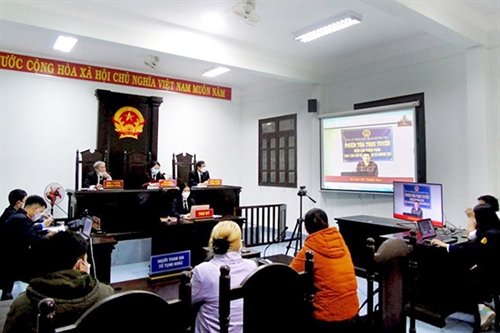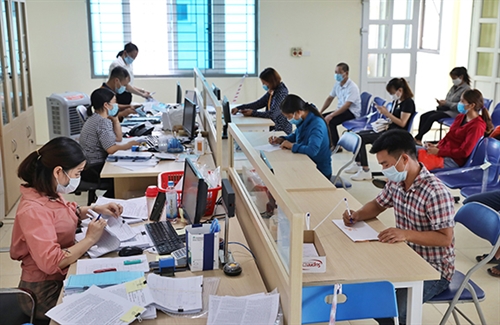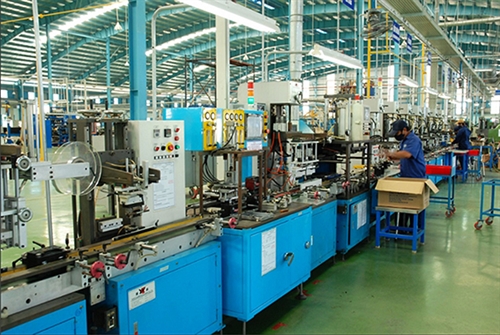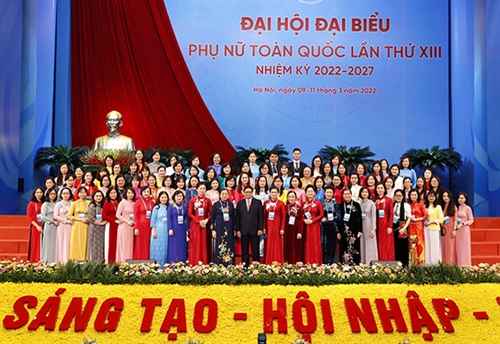Introduction
The 2021 Vietnam Provincial Governance and Public Administration Performance Index (PAPI) Report[1], released on May 10, shows improvements in basic infrastructure as citizens experienced better roads, water supply and sanitation, while many respondents reported less crime as lockdowns and travel restrictions may have helped improve law and order. There were, however, gaps in the national pandemic response with increasing governance challenges, concerning shifts in indicators tied to COVID-19, and a deterioration in household economic confidence.
This article is an excerpt from the 2021 PAPI Report and presents key findings from the 2021 PAPI citizen surveys. It presents two important sets of findings that will help inform policy focuses for Vietnam in 2022 and moving forward. First, it presents issues of greatest concern for citizens in 2021 at the impact of the fourth wave of the COVID-19 pandemic throughout the year. And, second, it summarizes important findings that are relevant for Vietnam’s 2022 policy discussion agenda relating to grassroots democracy and land administration. It closes with important implications and key takeaways from the findings from the 13th PAPI survey in 2021.
Issues of greatest concern for citizens in 2021
This section presents issues of greatest concern in 2021 for citizens and compares the latest findings with those since 2015. To assess changing citizen priorities over time, since 2015 the PAPI questionnaire has included an open-end question asking citizens to identify their most important concern that the State apparatus should address in the following year.
Figures 1-2 show the shifts in citizens’ concerns in 2021, compared to previous years, with COVID-19 the dominant factor in nearly all aspects of citizens’ lives. It should be noted that, by the time the 2021 PAPI survey was rolled out amid the fourth wave of infections to hit the country, the pandemic had claimed about 18,000 lives and this number would jump to nearly 40,000 by the time the survey was completed in mid-February 2022. Long-term lockdowns in economic and industrial hubs like Hanoi, Ho Chi Minh City, Da Nang, Binh Duong, Dong Nai and Long An as well as restrictive measures applied in more than 50 provinces with community transmission from July to October 2021 led to the first economic downturn in two decades in Vietnam. This resulted in a 6.17 percent contraction in national economic growth by the end of the third quarter of 2021.
In keeping with the pandemic, health and health insurance became the issue of greatest concern in 2021. Poverty and hunger remained high on the list, while national economic growth and jobs were third followed by employment (Figure 1).
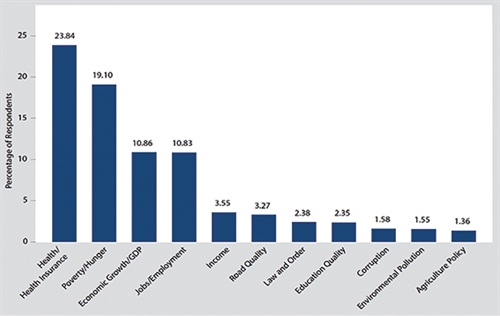 |
Indicative of a year when Vietnam was hit hardest by the pandemic, there was a dramatic spike in concern regarding health and the economy and correspondingly diminished worries about the environment, as Figure 2 shows. This is reflected in health and health insurance jumping to become the issues of greatest concern for citizens, the first time there has been a change at the top of the list since PAPI has asked this question. Poverty and hunger, which topped this list for the past five years, fell to second with national economic growth and jobs coming in at third.
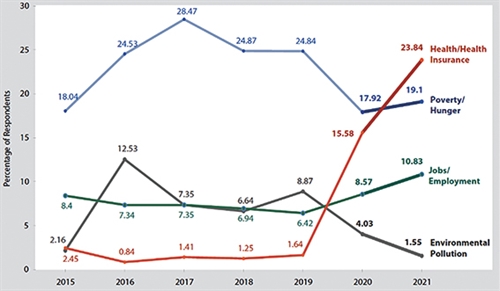
Indeed, pandemic-driven concerns about health and health insurance saw the category spike from 2 to 23 percent in just two years, while the emergence of short-term economic worries are reflected in economic growth and employment comprising two of the top-four concerns in 2021. Interestingly, women were more concerned about job security than men, while non-Kinh groups still considered poverty and poverty reduction their biggest worry (Figure 3).
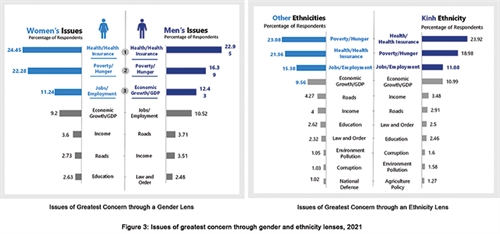
These financial uncertainties are further evident in respondents’ downbeat attitude toward Vietnam’s economic situation in 2021. Up to one-fourth of respondents perceived the country’s economy to be “bad”, while those who believed it was in a good shape fell below 50 percent. Likewise, nearly one-third of respondents thought their household economic situation was worse than before, an 11 percent jump from 2020. This contrasts starkly with the trend since 2011 until the emergence of COVID-19, which featured a steady increase in optimism about people’s household economic situation. When asked about household security in the next five years, the number of respondents who thought the situation would either get worse or be unpredictable was higher in 2021 than in previous years.
To follow up on the large share of citizens concerned about their household economy, the 2021 PAPI survey also looked at the job losses reported by respondents. Indeed, the pandemic exerted larger negative impacts on citizens’ employment and income in 2021 than in 2020. The proportion of respondents reporting job and income losses jumped by 10 percent over the past two years. Impacts were more widespread in 2021 than in 2020 (Figure 4), especially in key economic hubs in and surrounding Hanoi, Da Nang and Ho Chi Minh City, which encountered long-term lockdowns. These job and income losses are symptomatic of the restrictive measures which led to Vietnam’s first economic downturn in two decades and a 6.17 percent contraction in national economic growth by the end of the third quarter of 2021. However, as was the case in 2020, the predominantly ethnic minority-populated provinces located in the far north and northwest largely escaped severe COVID-19 impacts on jobs and incomes.
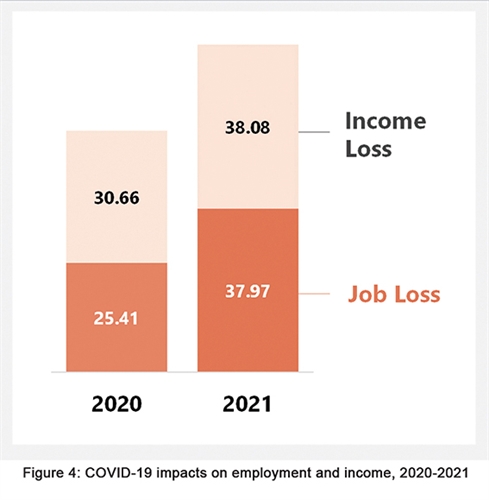
Furthermore, the 2021 PAPI survey included a battery of questions about government responses to the pandemic, a generational event that had a substantial impact on many indicators in 2021. The aim was to capture how citizens perceived and experienced government responses to the health crisis in 2021, and how they were impacted at personal and household levels. Overall, the percentage of interviewees satisfied with the government response to the pandemic declined from 89 percent in 2020 to 84 percent in 2021. This shift could be a result of increasingly challenging conditions and the emergence of the Delta variant from May 2021.
National overview of governance and public administration performance in 2021
| "These findings are important for deepening our understanding of the impacts of the pandemic on democratic governance that in turn can help support the governments - at both central and provincial levels - in preparing for future economic and health crises,” said UNDP Resident Representative in Vietnam Ms. Caitlin Wiesen at the launch of the 2021 PAPI Report |
This section presents overall national performance in governance and public administration in 2021 amid the surge of the fourth wave of COVID-19 across Vietnam and puts it in comparison with previous years. First, it brings forward time-series comparisons for dimensions that have not changed over time since 2019 (the year preceding the arrival of COVID-19) to 2021 (when Vietnam was badly hit by the pandemic). Second, it looks more deeply into the dimensions of Transparency in Local Decision-making, Control of Corruption in the Public Sector, and Public Service Delivery. Finally, it reveals findings about how much e-government facilities enabled citizens to access administrative services during the peak of the COVID-19 pandemic in 2021.
Figure 5 reveals a significant improvement in Public Service Delivery as well as the Environmental Governance and E-Governance dimensions to a lesser extent. Meanwhile, there was a consistent drop in performance in Dimension 1 on Participation at Local Levels during 2019-21, while previous election years of 2011 and 2016 posted much higher year-on-year scores.[2] Also, Dimension 3 on Vertical Accountability saw a sharp decrease compared to the previous two years. The drop may have resulted from local governments’ failure to handle the significant numbers of citizen requests for pandemic-related support policies in 2021. Dimension 4 on Control of Corruption in the Public Sector saw the first decline since the anti-corruption campaign initiated by the Communist Party of Vietnam in 2016. Dimension 6 on Public Service Delivery showed a significant improvement compared to 2020, with the results largely driven by higher scores in the Law and Order sub-dimension.
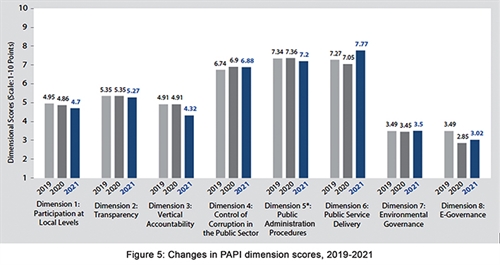
Note: Dimension 5 “Public Administrative Procedures” was restructured in 2021, so comparisons should be made with caution.
With 2021 witnessing elections of National Assembly delegates and People’s Council members in Vietnam, this section pays particular attention to Dimension 1 on Participation at Local Levels, which tracks patterns of voting behavior and electoral participation at local level. It zooms in on how citizens exercised their electoral participation rights when voting to select representatives at the National Assembly and People’s Councils at provincial, district and commune levels as well as at the village level (village head positions).
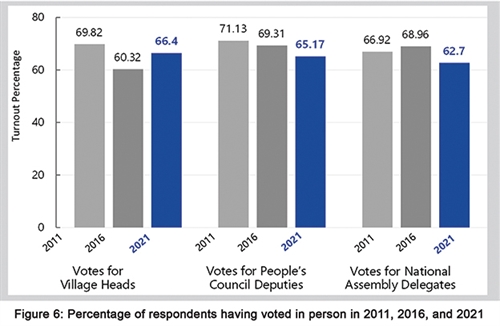
On citizens’ electoral participation at national and local levels, 2021 saw declines in the percentage of respondents who participated in elections of representatives to the National Assembly and People’s Councils at provincial, district and commune levels on May 23, 2021, as well as for their villages throughout the year. As Figure 6 shows, in 2021 the percentages of voters who showed up and voted in person for National Assembly and People’s Council representatives were lower than in the previous two elections in 2011 and 2016. While 71.13 percent of voters participated in the 2011 election for People’s Council deputies and 66.92 percent for National Assembly delegates, these numbers fell to 65.17 and 62.7 percent, respectively, in 2021. It is unclear whether the declines are a result of citizens’ disengagement with the elections or that they were held amid the arrival of the fourth wave of COVID-19 which spurred public hesitancy to visit voting sites in May 2021. Meanwhile, the turnouts for the village heads were higher than those for the National Assembly and People’s Councils and those in the previous two years of elections.
As shown in Figure 7, compared to PAPI survey results in the 2011 and 2016 elections, fewer men and women came to vote in person in the 2021 elections for delegates at the National Assembly and People’s Councils, and village heads. Also, women voted in person at substantially lower levels compared to men for all three elected positions. This was particularly evident in 2021, when women’s voting turnout was 11.4, 12.2 and 17 percentage points lower than for men in terms of the number of votes for the three positions, respectively. These disparities are consistent across the three election years studied by PAPI. This perhaps reflects the influence of proxy voting where one family member, often a man, votes on behalf of others.
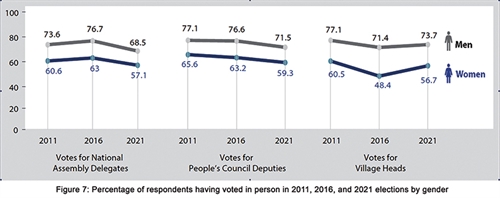
On Transparency in Local Decision-making (Dimension 2), as the 2021 PAPI findings show, limited transparency of local land use plans is the key reason for the lower scores in this dimension. Figure 8 reveals that those who said they were informed about local land use plans declined from 18.23 percent in 2020 to 14.47 percent in 2021.[3] Additionally, those who wanted an opportunity to comment on land use plans fell from 27.16 to 25.51 percent.
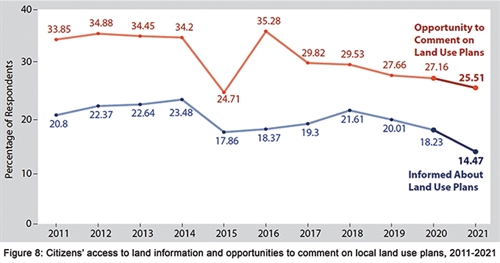
In terms of Control of Corruption in the Public Sector (Dimension 4), corruption pertaining to nepotism continued to drop (Figure 9), thus leading to some increases in the Equity in State Employment sub-dimension as shown in Figure 5 above. However, for other indicators, improvements stalled or even reversed. Meanwhile, as Figure 10 reveals, there was a slight increase in perception of bribes for construction permits and public health service delivery.
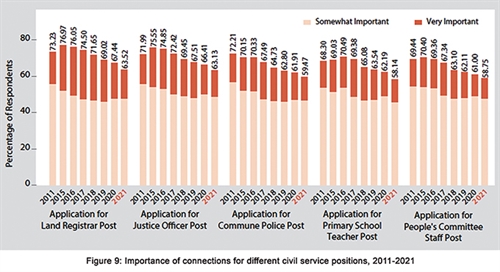
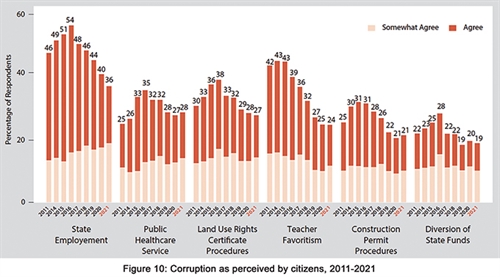
Similar to findings from the 2020 survey[4], lower corruption and heightened transparency correlated strongly with higher satisfaction with government responses to the pandemic. As Figure 11 reveals, a one-point increase in the Control of Corruption in the Public Sector dimension leads to a 1.7-point increase in citizen satisfaction with how governments at all levels responded to the multi-faceted challenges posed by COVID-19 in 2021. Similarly, a one-point increase in the Transparency in Local Decision-making dimension leads to a 1.4-point rise in satisfaction with the government response. However, the percentage of interviewees satisfied with the government response to the pandemic declined from 89 percent in 2020 to 84 percent in 2021.[5] This shift could be a result of increasingly challenging conditions and the emergence of the Delta variant from May 2021.
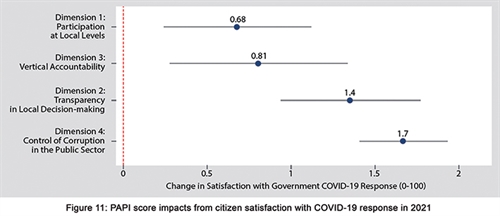
On the bright side, findings from the dimension on Public Service Delivery showed a significant improvement compared to 2020, with the results largely driven by higher scores in the Law and Order sub-dimension (Figure 12). Citizens felt safer and were less impacted by four types (vehicle theft, robbery, break-ins and physical violence) of crime in 2021, possibly due to pandemic-related lockdowns and restricted travel in most provinces. The sub-dimension on Public Primary Education saw a return to previous years after an anomalous dip in 2020 when schools were not ready to cope with new COVID-19 challenges. The sub-dimension on Basic Infrastructure saw steady improvement, especially in citizens’ access to roads, electricity and rubbish collection.
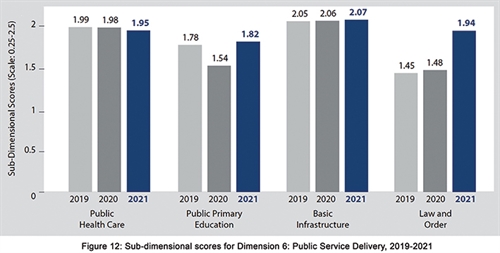
Nonetheless, the Public Healthcare sub-dimension declined slightly in 2021. However, the evaluation of the health sector may be worse than the PAPI indicators reveal. The PAPI indicator assesses the percentage of respondents who were satisfied with hospital services among those who elected to answer the question and had been to a public district hospital. Using this indicator, the level of satisfaction dropped from 61 percent in 2020 to 54 percent in 2021 when taking these two years of COVID-19 into account.
Finally, Dimension 8 on E-Governance saw some modest improvement. While COVID-19 pandemic could have been a driver for greater citizen demand for national and provincial e-government services, e-government portals and government responses through e-government portals were attributed to the overall poor performance in e-government services in 2021. Noticeably, there remains a large divide between access to the internet and e-government portals for e-services in all provinces (Figure 13).
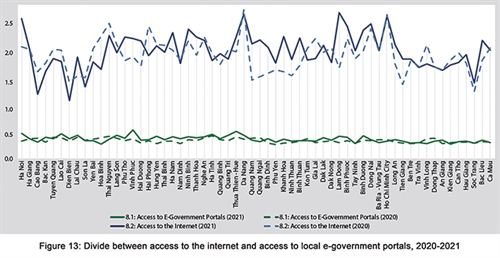
Meanwhile, similar to what was found in 2020, there were also very few users of the National Public Service Portal in 2021: only 3.53 percent of all 2021 respondents. Among these, two-thirds of those who used the portal searched for information about public administrative procedures, while below one percent used it for handling the procedures for themselves or families (Figure 14).

Implications and Key takeaways
| Speaking at the report launch, Dr. Nguyen Huu Dung, Vice President of the Central Committee of the Vietnam Fatherland Front, said: “PAPI has helped promote vertical accountability toward citizens, and contributed to innovation in the public sector to meet the Communist Party of Vietnam’s recently set goal that “people benefit”, aside from the conventional aims of “people know, people discuss, people do and people verify” in grassroots democracy implementation. This is in line with the spirit of the proposed Law on Implementation of Grassroots Democracy at the Commune Level to be discussed at the National Assembly this year [in 2022].” |
Entering a third government term (following 2011-16 and 2016-21), PAPI’s time-series datasets are a treasure trove of data and information that is useful for policy research and advocacy. PAPI data help anticipate governance trends and facilitates solutions to improve government functioning and performance, so that citizens feel more confident in governments and empowered to unleash their own potential to contribute to Vietnam’s recovery efforts and sustainable development, especially after the COVID-19 stricken year of 2021.
In particular, the 2021 PAPI data and information will be useful evidence for discussions on three important pieces of legislation on the National Assembly’s 2022 legislation agenda.[6] They include the first-ever draft Law on Implementation of Grassroots Democracy in Communes, Wards and Townships and amendments to the 2014 Land Law and the 2010 Law on Inspection. The Law on Implementation of Grassroots Democracy, if passed, is an upgrade on the 2007 Ordinance on Grassroots Democracy[7], upon which PAPI was initiated and many PAPI indicators were established to monitor how citizens engage in local governance and their active roles as per the ordinance’s updated motto “people know, people discuss, people do, people verify and people benefit”.
The 2021 PAPI survey findings from this article carry with them the following key takeaways:
- There was substantial impact of COVID-19 on many indicators in 2021, with some bright spots, including improvements in citizen access to roads, water supply and sanitation, possibly resulting from public investment from local governments, and less crime as lockdowns and travel restrictions may have helped improve law and order.
- However, the COVID-19 pandemic shifted concern in 2021. Increased strain on the health sector has heightened citizens’ focus on health and health insurance. It also leads to the need to pay greater attention to public district hospitals’ service delivery. Also, addressing bribes at public district hospitals is a must.
- There was an increased focus on concerns about national and household economic conditions as well as employment as the result of the pandemic. Thus, poverty assistance and stimulus packages are vital to support citizens recover from the turbulent year of 2021.
- Grassroots democracy implementation becomes more important as the Law under development to replace the Ordinance implies. Therefore, citizens’ electoral participation at the grassroots level, especially elections of village heads, is vital to make sure that citizens’ voices are heard in local decision-making process moving forward.
- There were declines in transparency of land use plans and land price frames, while the lack of transparency in land administration is a reason for a high number of land-related complaints and petitions. Upcoming amendments to the 2013 Land Law in the pipeline should strengthen citizen access to important land information.
- The declines in the scores of Transparency in Local Decision-making and Control of Corruption in the Public Sector dimensions possibly correlated with the decreasing citizen trust in government responses to the COVID-19 pandemic in 2021. Therefore, improving transparency and further tackling corruption could be an important investment to help strengthen citizen trust in the government.-



